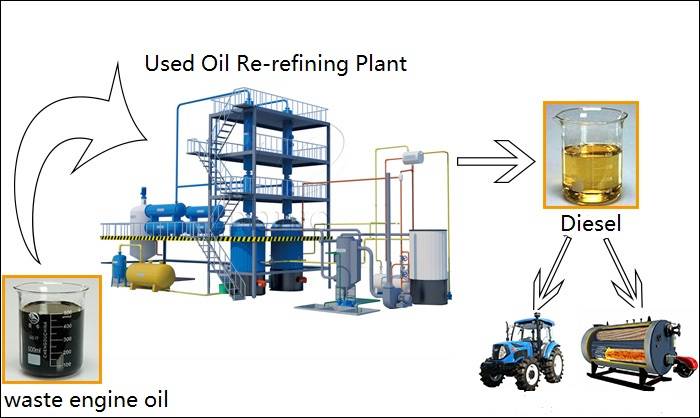Imagine being able to make a positive impact on the environment with a simple action you take in your garage. Recycling motor oil is one of those small yet significant steps you can take that not only benefits the planet but also offers numerous advantages for you and your community.
If you’ve ever wondered what happens to the oil after it’s drained from your car, or if you’re curious about how you can contribute to a cleaner world, you’re in the right place. You’ll discover the surprising benefits of recycling motor oil and how this seemingly minor task can lead to substantial environmental and economic gains.
Prepare to be amazed at how something so routine can make such a big difference!

Credit: www.wastetodaymagazine.com
Motor Oil Recycling Basics
Motor oil is the lifeblood of your engine, but what happens when it’s time for a change? Most people simply discard it, not knowing its potential for reuse. Recycling motor oil is a straightforward process that can make a significant environmental impact. It’s about taking small steps that lead to big changes.
Why Should You Consider Recycling Motor Oil?
Recycling motor oil isn’t just about saving the planet. It’s a practical way to reduce waste and conserve resources. Used motor oil can be cleaned, re-refined, and reused, reducing the need for new oil production. This means less strain on natural resources and less pollution.
How Does Motor Oil Recycling Work?
The process begins with collecting used oil from your vehicle. You can store it in a clean, leak-proof container. Many auto shops and recycling centers offer collection services. Once collected, the oil goes through a refining process to remove contaminants. The cleaned oil is then ready for reuse in various applications.
Where Can You Recycle Motor Oil?
Many communities have designated drop-off points for used motor oil. Check with local service stations and auto repair shops. They often have facilities to collect and recycle motor oil. You might be surprised how convenient it is to recycle with options close to home.
What Are The Environmental Benefits?
Recycling motor oil helps prevent pollution. It reduces the risk of oil seeping into soil and waterways. This keeps ecosystems healthy and thriving. Moreover, it decreases greenhouse gas emissions linked to new oil production. Every drop recycled makes a difference.
Can You Save Money By Recycling Motor Oil?
While recycling itself doesn’t directly save you money, it contributes to economic efficiency. Re-refined oil is often cheaper than new oil. By reducing demand for new oil, prices can stabilize. It’s a win-win for your wallet and the environment.
Recycling motor oil might seem like a small step, but consider the ripple effect. How can you contribute to a cleaner planet? Your actions today could inspire others tomorrow. Every quart counts in the journey towards sustainability. Why not take that step and be part of the solution?

Credit: www.purepathtech.com
Environmental Impact
Recycling motor oil is more than just a smart choice—it’s a powerful way to contribute to environmental conservation. Used motor oil, when disposed of improperly, can wreak havoc on nature. You might not realize it, but every drop counts. Imagine the impact if everyone started recycling their motor oil. Wouldn’t it be incredible to see cleaner rivers and healthier wildlife? Let’s explore how recycling motor oil can make a difference to our environment.
Reducing Pollution
Pollution from used motor oil is a silent threat. It seeps into the ground, affecting the soil and plants. Recycling motor oil reduces this pollution significantly. When you recycle, the oil is cleaned and reused, preventing harmful substances from entering the environment.
Think about the air you breathe and the land you walk on. By recycling, you help reduce the pollutants that contaminate them. Less pollution means a healthier planet for everyone. Every time you recycle, you’re taking a stand against pollution.
Protecting Water Sources
Water is life, yet used motor oil can poison our water sources. A single gallon of motor oil can contaminate one million gallons of water. By recycling, you ensure that this precious resource remains clean and safe.
Consider the fish swimming in rivers and the birds drinking from lakes. Recycling motor oil protects these water sources from toxic chemicals. You have the power to keep water clean for future generations. Isn’t that a responsibility worth taking?
Next time you change your oil, think about the impact. Will you choose to recycle? By making this small change, you can contribute to a healthier planet. Together, we can make a big difference with small actions.
Resource Conservation
Resource conservation plays a vital role in preserving our environment. Recycling motor oil is a practical way to conserve valuable resources. This process not only saves raw materials but also boosts energy efficiency.
Saving Raw Materials
Recycling motor oil reduces the need for fresh oil production. Used oil undergoes refining to eliminate impurities. This creates clean, reusable oil. This minimizes the demand for new crude oil extraction. Less extraction means fewer environmental disruptions. It helps maintain natural ecosystems. Recycling supports sustainable practices.
Energy Efficiency
Recycling motor oil is energy-efficient. Refining used oil requires less energy than processing new crude oil. This cuts down energy consumption. Lower energy use reduces greenhouse gas emissions. It helps fight climate change. It also saves energy resources for future use. Recycling is an eco-friendly choice.

Credit: www.uomausa.com
Economic Benefits
Recycling motor oil saves money by reducing the need for new oil production. This process also lowers environmental cleanup costs. Recycled oil can be reused, decreasing waste and conserving resources.
Recycling motor oil is not just an environmentally responsible choice; it offers substantial economic benefits that ripple through communities. By focusing on the economic advantages, you can better understand how recycling motor oil makes a difference in your wallet and the broader economy. Let’s explore how you, as a consumer and a community member, can benefit economically.Cost Savings
Recycling motor oil can lead to significant cost savings for you and your community. Used motor oil can be re-refined into new oil, which is typically cheaper than producing oil from scratch. This means you pay less for oil changes when you choose re-refined oil. Moreover, by reducing the demand for new oil production, recycling helps lower the overall market price of oil, benefiting everyone.Job Creation
The recycling industry is a thriving sector that creates numerous job opportunities. When you recycle motor oil, you support local recycling centers and companies that process and refine used oil. This, in turn, leads to job creation in your community, from collection and transportation to processing and retail. Have you ever wondered how your actions could support job growth? Recycling motor oil is one way to contribute positively to your local economy. By engaging with these economic benefits, you not only save money but also become an active participant in fostering a sustainable economy. Have you considered how your recycling habits impact the economy around you? Making a simple choice to recycle can have far-reaching effects, proving that small actions can indeed lead to significant economic advantages.Sustainable Practices
Recycling motor oil is a key sustainable practice. It helps preserve natural resources. Motor oil can be reused, reducing the need for new oil production. This practice minimizes environmental harm and conserves energy. Recycling motor oil supports a cleaner, greener planet.
Supporting Circular Economy
Recycling motor oil plays a vital role in the circular economy. Used oil undergoes treatment and purification. This process turns it into fresh, reusable oil. It decreases the demand for new crude oil. This helps conserve natural resources. It also reduces the energy needed for refining. By recycling, we keep materials in use longer. This approach reduces waste and promotes sustainability.
Promoting Green Innovation
Recycling motor oil drives green innovation. Researchers develop advanced recycling techniques. These methods make oil recycling more efficient. Innovation leads to better technologies for processing used oil. New technologies also help reduce recycling costs. This makes oil recycling more accessible to everyone. Green innovation in oil recycling supports a healthier environment.
Community Engagement
Recycling motor oil offers several benefits. It reduces environmental pollution by keeping oil out of landfills and waterways. It also conserves resources, as recycled oil can be re-refined and used again, saving energy and raw materials. Community involvement in recycling helps promote sustainable practices and protects natural ecosystems.
Recycling motor oil isn’t just about protecting the environment; it’s also a powerful way to bring communities together. When people unite around a shared purpose, like keeping used motor oil out of landfills and waterways, the benefits ripple through neighborhoods. Community engagement plays a pivotal role in spreading awareness and fostering collective responsibility. By involving everyone, from school children to local businesses, your community can become a vibrant hub of sustainable practices.Educational Programs
Educational programs are the cornerstone of community engagement. Schools can introduce recycling motor oil into their science curriculum, sparking curiosity and responsibility in young minds. Imagine a classroom where students learn to conduct safe experiments using oil recycling kits, fostering hands-on understanding of environmental impact. Workshops for adults can also offer valuable insights. Think about local events where you can learn about the process of recycling motor oil and the long-term benefits it holds for your community. Such programs empower everyone to make informed decisions.Local Initiatives
Local initiatives provide practical avenues for community involvement. Organizing motor oil recycling drives not only facilitates proper disposal but also strengthens community bonds. Picture a weekend event where families come together to drop off used motor oil and learn about its recycling process. Partnerships with local businesses can amplify these efforts. Auto repair shops and service stations can become collection points, making it convenient for you to recycle used oil. These initiatives demonstrate how businesses and citizens can collaborate for a healthier environment. Community engagement in recycling motor oil offers a multitude of benefits. By participating in educational programs and supporting local initiatives, you contribute to a cleaner, more sustainable future. How can your community further harness the power of collective action to enhance these efforts?Conclusion
Recycling motor oil offers many benefits. It protects the environment by reducing pollution. Clean oil means less waste in landfills. It also saves energy. Recycled oil needs less processing than new oil. This conservation helps preserve natural resources. Plus, recycling creates jobs.
Collection and processing require skilled workers. It’s a win for both people and the planet. Always recycle used motor oil. Every drop counts towards a cleaner world. Make it a habit. Your small action makes a big difference. Let’s keep our earth healthy and sustainable for future generations.
